Disclaimer: Bluetti sent this product to us for free for a review. That does not affect our opinion about the product. In this article, we list both what we like and dislike. Read more about this here.
The Bluetti EB55 Ticks Almost All Boxes Of A Great Power Station
Earlier this year, we reviewed the Bluetti EB3A power station and PV200 solar panel. We were impressed by both, and didn’t hesitate when Bluetti asked if we would like to review the EB55.
The Bluetti EB55 can be seen as a big brother to EB3A, with more battery capacity, a more powerful inverter, and more ports.
Check Price at BluettiPower.com
Also available on Amazon (click to check price)
But the smaller EB3A is newer and has a couple of features you won’t find in the EB55. Like a true UPS mode and WiFi/Bluetooth.
So is the EB55 worth considering buying in 2024? Let’s find out.
Bluetti EB55 – Features
Battery Capacity
The Bluetti EB55 is rated at 537Wh (watt-hours).
We can use the battery capacity to estimate how long it can power a device.
A 537Wh battery will power a 50W device for a little over nine hours with a 85% inverter efficiency (537Wh/50W*0.85=9.12).
The battery cells used are LiFePO4 (LFP). These type of batteries are known to be safe and durable, rated for up to 2500 cycles before reaching 80% capacity.
That’s a lot better than the more common Li-Ion batteries, that average 500-800 cycles.
Inverter
The pure sine wave inverter in the EB55 can output up to 700W continuously, with a peak wattage of 1400.
It’s the inverter that powers the AC outlets and lets you plug regular household electronics into the power station. However, it’s not as powerful as an outlet in your home.
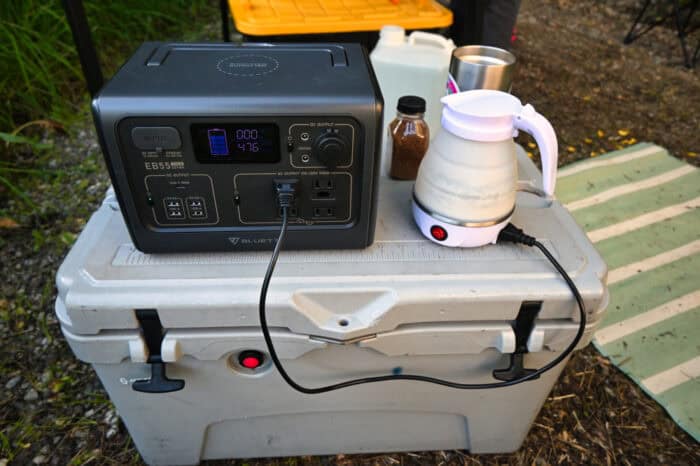
Instead of the 1800W that your household outlets can output, the EB55 can do 700W.
That’s enough to power a lot of electronics and small kitchen appliances. Like a TV, CPAP machine, mini fridge, rice cooker, or a desktop computer.
I was able to draw at least 670W without issues, I had to push it to over 800 for the inverter to shut off. This does not damage the inverter.
Ports
All ports can be found on the front of the power station.
There are four AC outlets, two are three-prong and two are two-prong.
Next to the outlets, there are four USB A ports and one USB C port.
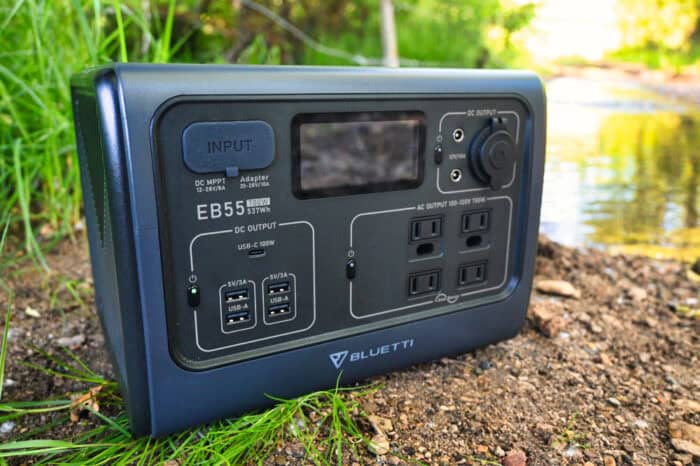
The USB A ports are rated for up to 15W, and the USB C port up to 100W. The USB C port cannot be used to charge the Bluetti.
Above the AC outlets, there are three 12V DC outputs. One is a full-size cigarette lighter port, where you can plug in a 12V fridge/freezer and similar electronics. There are also two DC5521 outputs for powering small gadgets like lights.
I tested the USB ports to make sure they can output what they’re rated at, and they can.
Display
The display on the front shows the input/output watts and battery level in bars (in increments of 20).

I wish it would’ve shown a battery percentage in 1 to 100 percent, that’s a big con in my book.
The display turns on when you push one of the buttons that turn on and off the different outputs.
Charging
With the included AC wall charger, the Bluetti can be fully charged in 3.2 hours. It takes 3-6 hours with the car charger.
It supports dual charging, either with another AC charger, or with an AC charger and a solar panel.
With two wall chargers, or a wall charger plus a solar panel, the charging time can be brought down to 1.8 hours.
Bluetti sells the extra AC adapter here (click to view on Amazon). It includes the cable required to use two of them at the same time with the EB55.
Thanks to the built-in MPPT solar charge controller, it’s possible to quickly recharge the battery using solar panels.
It has an XT60 input, and Bluetti includes an MC4 to XT60 adapter so it’s compatible with a lot of solar panels right out of the box.
The supported input voltage range is 12-28V, up to 8A. With the Bluetti PV200 solar panel, it was charging at a 154W input on a sunny afternoon.
That’s not amazing, but not bad either.
It’s possible to connect two solar panels in parallel to increase the charging input, but it does not support series connections.
Other Features
On top, there is a 15W wireless charging pad. It supports the Qi standard, so it can charge the latest phones among other things wirelessly.
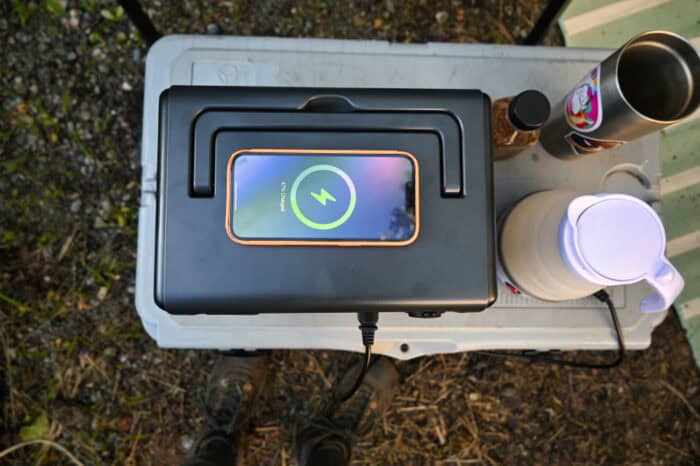
Next to the charging pad, there is a handle that folds.
It folds up and down and sits flush with the body of the EB55 when not in use. It’s a good handle that feels like it won’t break off even if you would swing it around.
On the back, there is a flashlight. It’s a bright light controlled with a button next to it.
Size & Weight
The EB55 weighs 16.5 pounds and measures 10.9 by 7.8 by 7.9 inches.
In The Box
Bluetti includes a wall charger, a car charger, and a solar cable (MC4 to XT60).
My Review
Like
Great port selection
The EB55 has the most outputs I have seen on a ~500Wh power station, with a total of 12 outputs and a wireless charging pad.
It might be messy, but you can technically charge or power over 10 devices at the same time.
LiFePO4 Batteries
LiFePO4 batteries are great because they are safe and durable. Durable in the sense that they’re able to handle a lot of cycles before losing its original capacity.
The more commonly used Li-Ion batteries degrade faster and are known to have more safety risks than LiFePO4 batteries.

One downside with LiFePO4 cells is that they tend to weigh more than Li-Ion, but I think it’s worth the weight since it’s going to last a lot longer.
I don’t think you should buy a Li-Ion power station in 2024, because there are so many LiFePO4 options available.
100W USB C
The 100W USB C port is great and capable of charging my devices quickly and efficiently. I charge my MacBook Pro through USB C, and this port can recharge my laptop in a little over an hour.
One thing that would’ve made it even better would be if it was possible to charge the Bluetti using this port.
Wireless charging pad
My phone and earbuds supports Qi, and I like that I can charge these devices wirelessly with the EB55.
It’s not slow either, maxing out at 15W.
The fewer cables I have to bring with me, the better.
Dual inputs
I like that it’s possible to use a solar panel at the same time as the wall charger.
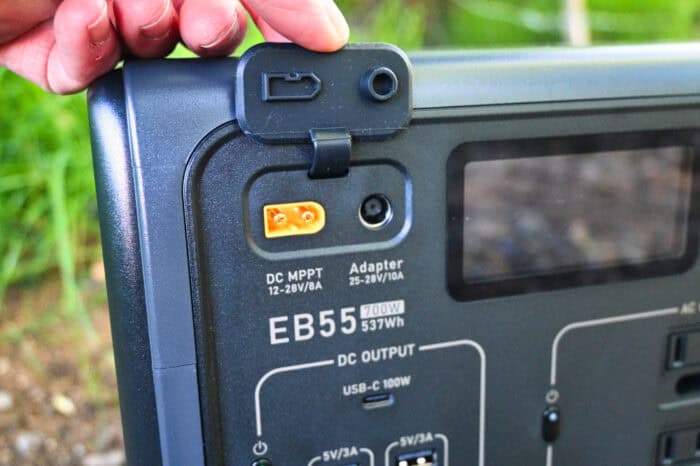
Unfortunately, you can’t use a solar panel at the same time as the car charger since they use the same XT60 connector.
Don’t Like
The AC charger has a fan that always runs
The AC charger included with the Bluetti EB55 has a small fan that will stay on, no matter if the power station is empty or full.
I wouldn’t be complaining about it if it turned off as soon as the battery was fully charged and the charger was cool.
The display
Why does the display only show the battery level in increments of 20%? A power station needs to show the battery percentage from 1 to 100 percent.
Why? Because if the display says there is 20% left, you don’t know whether it’s actually 1% or 19%.
It also doesn’t give us any other information than the input/output watts. A couple of years ago, that would’ve been enough. But today we are used to seeing a time to empty/full estimate and what ports are active.
Even though every type of port has a button with a light that is lit when the port is active, it’s hard to see it outside during the day.
No Wi-Fi/Bluetooth support
There is no way to control and monitor the power station with your phone, since the Bluetti EB55 does not have Wi-Fi or Bluetooth built-in.
Conclusion
I think the Bluetti EB55 is a good power station because it uses LiFePO4 batteries, has a lot of ports, dual inputs, and a relatively powerful inverter.
But the things I list above as things I don’t like did frustrate me, and not having a battery percentage is a deal breaker to me.
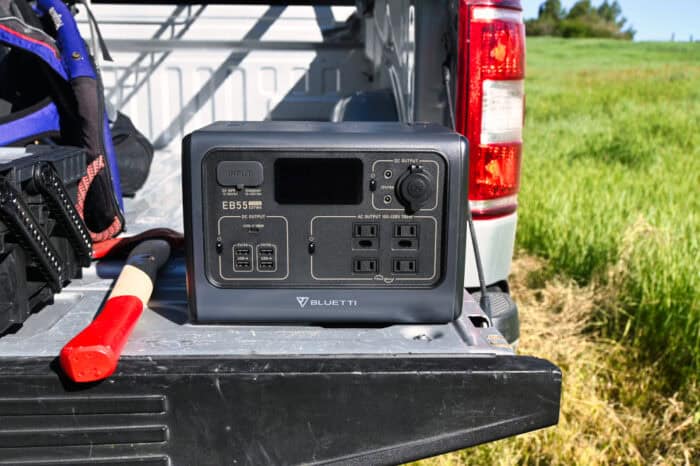
If you’re looking for a power station to bring with you on a camping trip for a weekend so the family can keep their devices charged, the EB55 is a great choice and is going to serve you well.
That’s also the case for homeowners looking for a power backup solution. Combine it with at least a 100W (I recommend the PV200) solar panel, and you’re good to go.
Full-time travelers that need to charge and discharge the battery daily are better off with a different power station, because of the cons I listed.
Please leave a comment down below if you have questions.

